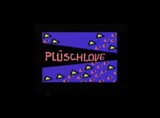Videotape
4'30min., sound; Commodore C64 with digitizer and graphics tablet, animations programmed in Basic, video camera, U-matic lowband
In co-production with Gudrun Bielz
Love scenes from two movie classics are rasterized, overdrawn, overstretched and squeezed, slowed down and accelerated by the computer. Plüschlove is a montage of real, digitized (i.e. computer-generated) and computer-modified images. Theme: trivia love.
Peter Weibel's title proposal: "Fake Papers".
Anyone who films reality eats their soup dutifully, because they've been served both the same way. Anyone who edits films, i.e. images of reality, and mixes them with images artificially generated by the computer, conveys an idea of the artificiality of reality. The digital manipulation of film-images speaks to the changeability of images and reality. In this digital world of images, love is just cold booze from an old world.
Counterfeit papers are the images of the world and love. But at least they are also the energetic charm of the simulation. In a world that is a hotel where everyone only knows a cold exit, the fake passports (of survival fantasy, of play, of escape, of love) are perhaps the only chance to escape reality. I reckon, that the actual title of Bielz and Schnell's video is "Fake Papers". It reveals the true character of aesthetics, of images, of the world.
Peter Weibel (translated from the original German)
It is clear that cybernetics is the beginning of a new religion that, with Star Wars, has prophesized its ownapocalypse. Of course, Gudrun Bielz and Ruth Schnell seem like two atheists who secretly say black masses in the cathedrals of technocracy. The blasphemous keyword is: dismantling! Dismantling of the images, dismantling of reality.
Because our culture tirelessly generates a flood of redundant images that are constantly and inexorably repeated- icons of stars, pin-ups, models and styled prototypes that parasitically absorb the real and the emotional-, the task therefore falls upon the eternal youth to effectively destroy immortal phantoms. Of these, Elvis is not a bad example. Likewise, Plushlove, the first animated computer film by Schnell and Bielz, decontextualizes, alienates, repurposes and revises quotes from film classics. 39 Steps (by Hitchcock) and High Sierra (by Raoul Walsh, and incidentally the first lead role for Humphrey Bogart), both films almost half a century old, still offer unsurpassed scenes of male/female longing, closeness and distance. These images are rasterized, mechanically disassembled, electronically assembled, coloured, overdrawn, stretched and accelerated... uncannily funny etudes about our produced pre-images.
High technology promises profit, power and convenience- the electronic paradise. In the hands of Bielz and Schnell, the electronic becomes uncomfortable and unruly. They use omnipotent illusion machines to unroll the machine illusions. The images are dematerialized, the appearance dissolves into sham. The two artists refer to the fact that automatic computers, screens and telecommunications inconspicuously infiltrate our everyday life. So why not handle the stuff that's under our noses everywhere?
Friedrich Geyrhofer, in: Der blamierte Computer, Wiener, November 1985 (translated from the original German)
Exhibitions:
1986, Terminal Kunst, Ars Electronica 86, Linz (AT)
 Images
Images
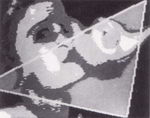
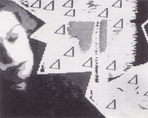
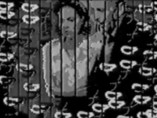
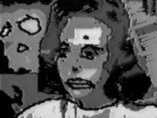
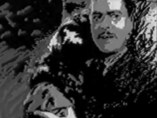
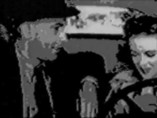
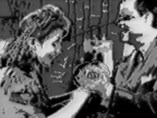
 Video
Video
